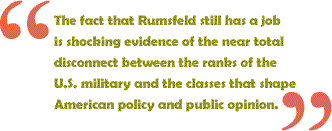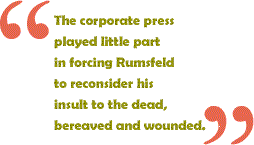|

If
the U.S. were a healthy parliamentary democracy, Donald Rumsfeld's
remarks of January 7 would have brought down George Bush's government,
necessitating new elections. Instead, the man with the demonic
grin continues as the drum major for new foreign wars, even
as he belittles a previous war's dead.
Conscript
soldiers of years past added "no value, no advantage, really..."
to the armed forces, the Secretary of Defense told reporters
at his Pentagon briefing.
Draftees
filled 30 percent of the body bags in Vietnam - but that's of
little "value" to Rumsfeld, or to the chicken hawk
media that cover the Pentagon. Apparently, the people who decide
what is news in America share Rumsfeld's nonchalance on the
subject of 17,725 American corpses.
There
is something profoundly out of synch about a society in which
the Secretary of Defense can violate with impunity the most
sacred taboos concerning those who have died on the battlefield,
while simultaneously fomenting war hysteria. The fact that Rumsfeld
still has a job is shocking evidence of the near total disconnect
between the ranks of the U.S. military and the classes that
shape American policy and public opinion.
It
is as if Rumsfeld were talking about dead men from a different
country.
Just
as with Trent Lott's birthday praise for Strom Thurmond's Dixiecrat
legacy, the corporate press  initially
treated Rumsfeld's statement as a minor event, hardly worth
mentioning. Not until January 21 - two weeks after reporters
from virtually every national corporate news outfit heard Rumsfeld
cavalierly diminish the value of the dead - did Rumsfeld issue
a bland apology. The defense chief was compelled to respond
to complaints from Senators Tom Daschle of South Dakota and
John Kerry of Massachusetts and Illinois Representative Lane
Evans, who did not rouse themselves until long after Jan 7. initially
treated Rumsfeld's statement as a minor event, hardly worth
mentioning. Not until January 21 - two weeks after reporters
from virtually every national corporate news outfit heard Rumsfeld
cavalierly diminish the value of the dead - did Rumsfeld issue
a bland apology. The defense chief was compelled to respond
to complaints from Senators Tom Daschle of South Dakota and
John Kerry of Massachusetts and Illinois Representative Lane
Evans, who did not rouse themselves until long after Jan 7.
Media
make the news. The corporate press are self-starting,
self-generating news engines, fully capable of creating controversy
out of whole cloth. Yet they played little part in forcing Rumsfeld
to reconsider his insult to the dead, bereaved and wounded.
Instead, it fell to veterans groups, both pro- and anti-war,
to denounce Rumsfeld's outrage - cries that eventually moved
a few prominent politicians.
Hundreds
of media eyes and ears were focused on Rumsfeld's January 7
briefing, from reporters and producers on the scene to editors
watching the live feed back at their bases. Their collective
job is to await the newsworthy quote, package it and, if one
of their reporters is present, direct him to pursue the story.
Top editors scan the submissions of their teams in the field,
looking for the standout items, "news" that is fit
to hype. At most print and electronic outlets, Rumsfeld's verbal
assault against draftees failed to make the cut. The Washington
Post devoted five sentences to the story, in its page 5, Washington
in Brief column, a potpourri of federal agency blurbs.
This
is a commentary about class. Rumsfeld escaped media-driven censure
for two weeks because the class that populates the media machinery
have little or no connection to actual soldiers, sailors
or Marines. The vaunted U.S. military that is inexorably
garrisoning the world is made up of men and women that editors,
producers and talking faces have never met, except on assignment.
The U.S. military is drawn from five percent of U.S. families
- not much of a Nielson rating and, more importantly, far too
narrow a spectrum to intrude on the consciousnesses of the more
influential sectors of society. They are abstractions.
Rumsfeld's
callous remarks failed to register as such among the social
cohort that was his immediate audience: media professionals.
And they are no different than their counterparts in the upper
middle classes from which the professions are drawn. For 30
years, military service has been neither a threat nor an option
for most of the U.S. population. The social distance between
those who serve and those who do not has grown vast. How else
to explain the collective, cold disregard for 17,725 not-so-long
ago dead?
The
reality is colder still: the failure of Rumsfeld's remarks to
ignite a human response among his  media
audience indicates a general lack of empathy with soldiers as
people like themselves. It is not just draftees that pass
unmourned, but the rest of the fallen 58,000, as well. media
audience indicates a general lack of empathy with soldiers as
people like themselves. It is not just draftees that pass
unmourned, but the rest of the fallen 58,000, as well.
In
that sense, Rumsfeld was indeed denigrating dead men from another
country, whom he could - quite literally - devalue with impunity.
Today's
soldiers can expect no more empathy than that accorded the disrespected
dead. If soldiers were truly valued as fellow citizens, could
Rumsfeld remain Secretary of Defense?
South
Carolina Senator Ernest Hollings has joined Black Congressmen
Charles Rangel and John Conyers in calling for a return to some
form of compulsory national service.
"It's
not the Army going to war. It's the country going to war,"
said Hollings. But 95 percent of the country would never consider
going to war. Other people do that for them.
Rumsfeld
loves his perfect weapon, the volunteer military. They may die
in the nation's imperial enterprise but, among the people whose
opinions count, they will not be personally missed.

Send
this page to a friend
www.blackcommentator.com
Your
comments are welcome. Visit the Contact
Us page for E-mail or Feedback.
Click
here to return to the home page
|

